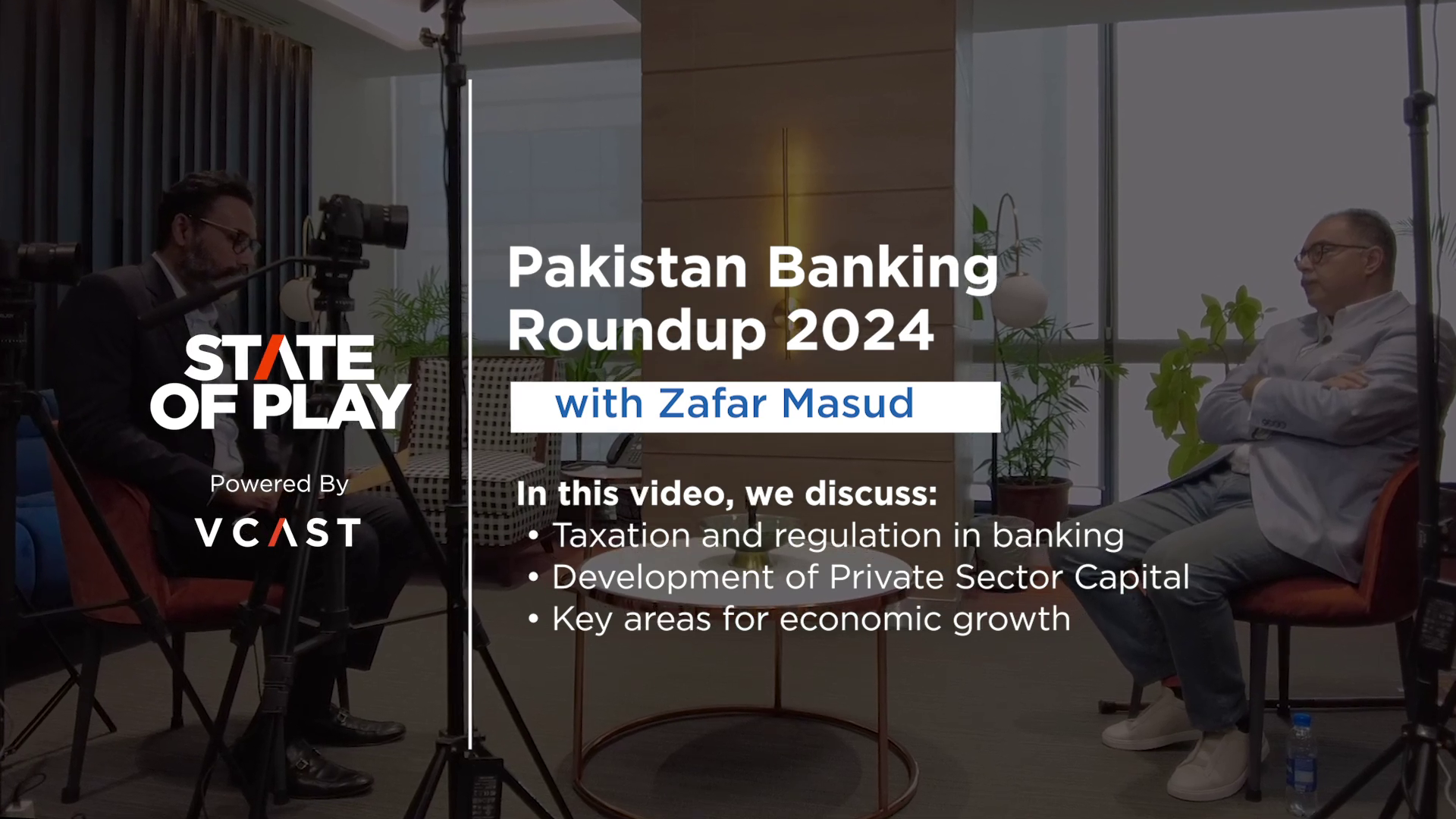Banking Sector Roundup 2024

Mr. Zafar Masud unpacks the State of Play in Banking. Talking about taxation and regulation, development of private sector capital, and key areas of economic growth.
“In a country where sectors are actively making efforts to avoid paying taxes – the banking sector is ready to pay even more. You can tax us more, but take it from our income – don’t distort our balance sheets.”
In this conversation with Zafar Masud, President & CEO of The Bank of Punjab @TheBankofPunjabOfficial, and Chairman of the Pakistan Banks’ Association, we unpack the State of Play in Banking.
We talk about taxation and regulation, development of private sector capital, and key areas of economic growth.
Source: VCAST Online
Pakistan’s Banking Sector Poised for Growth Despite Challenges, Says Bank of Punjab CEO
KARACHI – Pakistan’s banking sector is navigating a complex economic landscape but remains poised for growth, according to Zafar Masud, President and CEO of Bank of Punjab and Chairman of the Pakistan Banks Association. In a recent video interview, Masud addressed key issues facing the sector, including the impact of the Asset Deposit Ratio (ADR) tax and the crucial role banks play in supporting the nation’s economic development.
The discussion highlighted the ongoing debate surrounding the ADR tax, a levy imposed on banks with a high ratio of deposits to assets. Masud provided insights into the industry’s perspective on the tax, explaining its potential effects on lending and overall banking operations. While the video doesn’t explicitly state a stance for or against the tax, it frames the discussion as an important consideration for policymakers and banking leaders.
Beyond the ADR tax, the conversation explored the broader role of banks in driving economic growth. Masud emphasized the importance of financial institutions in providing credit to businesses, fostering investment, and facilitating trade. He outlined the sector’s commitment to supporting various industries and contributing to the overall stability and progress of the Pakistani economy.
The interview also touched upon the challenges and opportunities currently shaping the banking landscape. While specific challenges weren’t detailed in the provided information, the discussion acknowledged the dynamic nature of the sector and the need for banks to adapt to evolving market conditions and regulatory frameworks. The focus remained optimistic, highlighting the potential for growth and innovation within the Pakistani banking industry.
The video serves as a valuable resource for understanding the current state of Pakistan’s banking sector and the perspectives of its key leaders. By addressing critical issues and emphasizing the sector’s commitment to economic development, Masud’s insights offer a glimpse into the future direction of banking in Pakistan.
What is ADR tax?
The video says that the ADR tax, or Asset Deposit Ratio tax, is a levy imposed on banks in Pakistan based on the ratio of their deposits to their assets. Here’s a breakdown:
- How it works:
- Banks are required to maintain a certain level of assets relative to their deposits.
- If a bank’s assets fall below a specified threshold (typically 50% or 40%), they are subject to a tax penalty.
- The tax rate increases progressively as the asset-to-deposit ratio decreases.
- Purpose:
- The primary objective of the ADR tax is to encourage banks to lend more to the private sector.
- By penalizing banks with low asset-to-deposit ratios, the government aims to incentivize them to invest their deposits in productive economic activities, such as loans to businesses.
- Controversy:
- The ADR tax has been a subject of debate within the Pakistani banking sector.
- Some argue that it distorts lending decisions and can discourage banks from lending to certain sectors or borrowers.
- Others contend that it is necessary to ensure that banks fulfill their role in supporting economic growth.
- Impact:
- The impact of the ADR tax on the banking sector and the broader economy is a complex issue with varying perspectives.
- It’s important to note that the specific details and implications of the tax can change based on the prevailing economic conditions and government policies.
In summary: The ADR tax is a regulatory tool designed to influence bank lending behavior. While its intended purpose is to stimulate economic growth, its actual impact and effectiveness are subject to ongoing debate and evaluation.